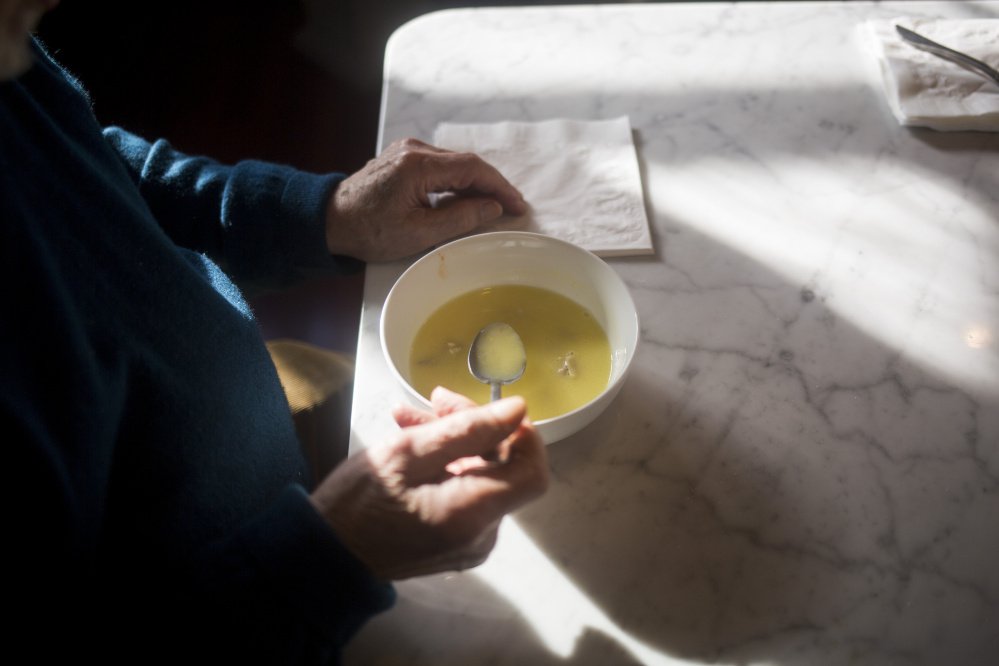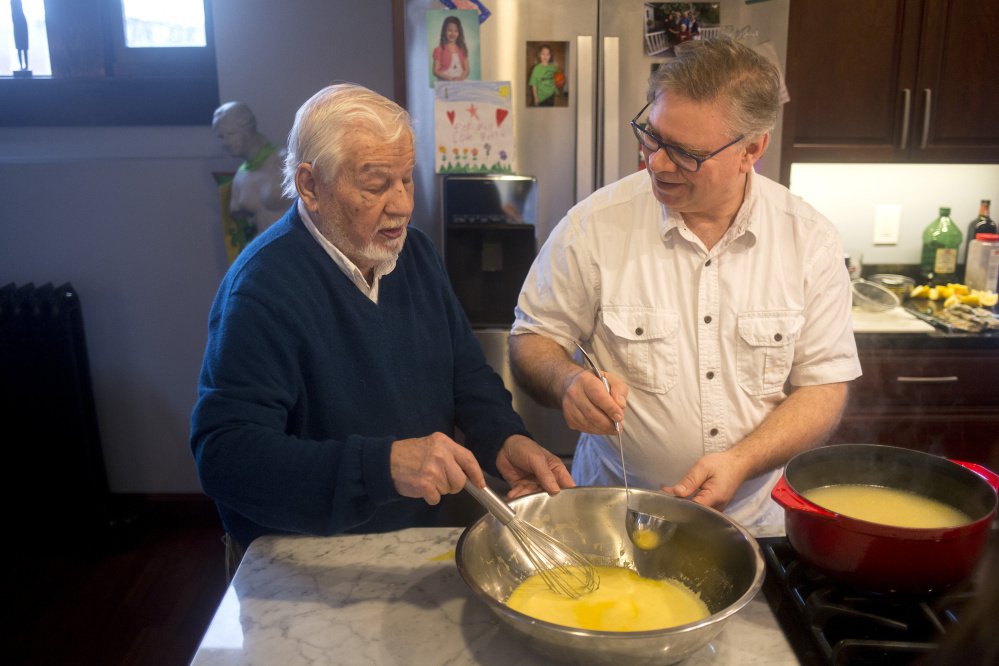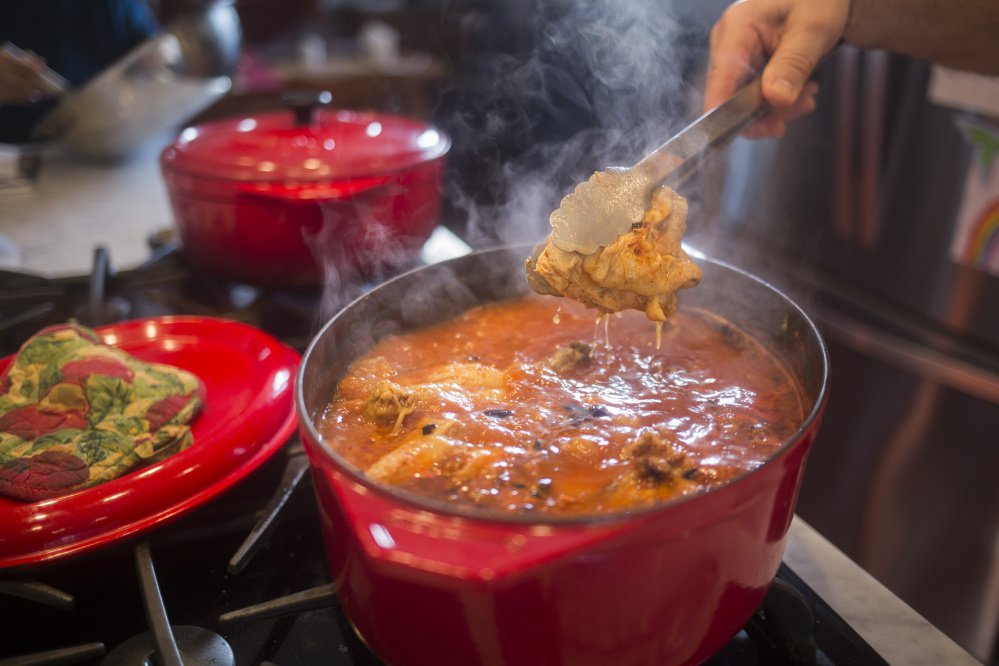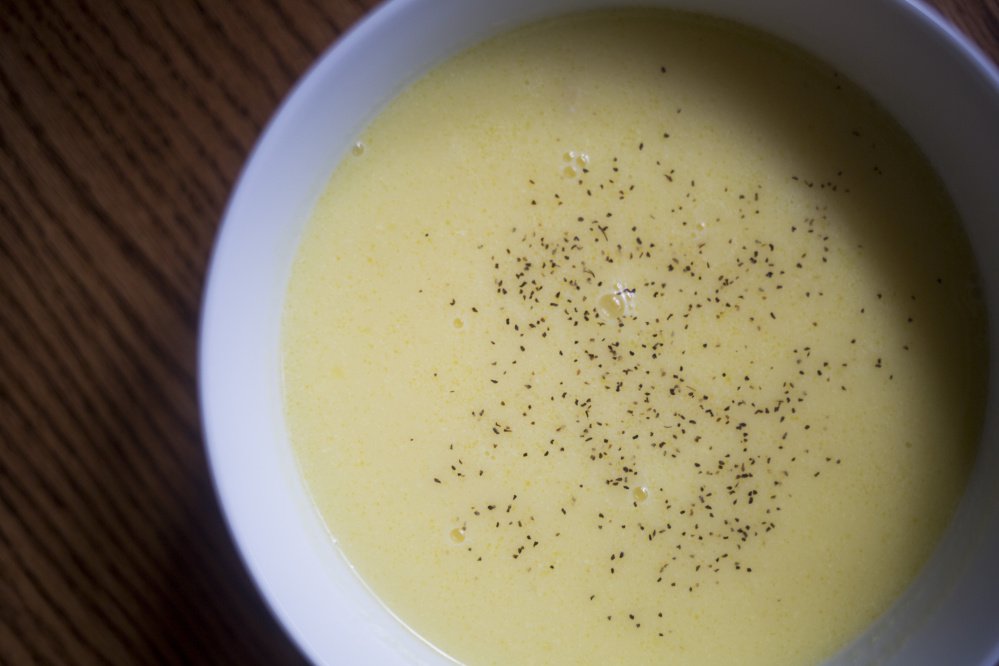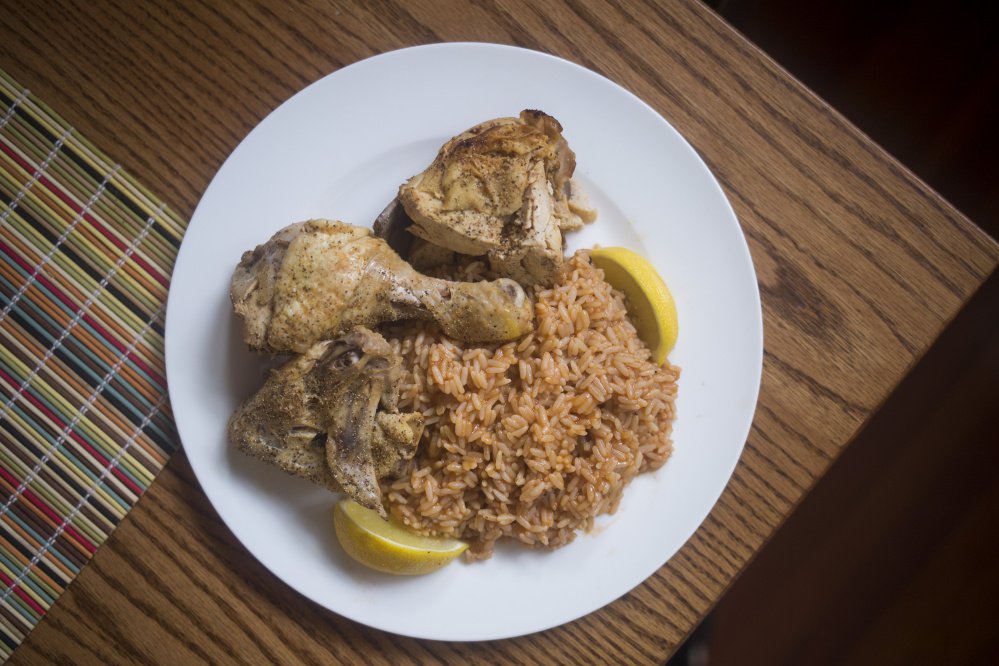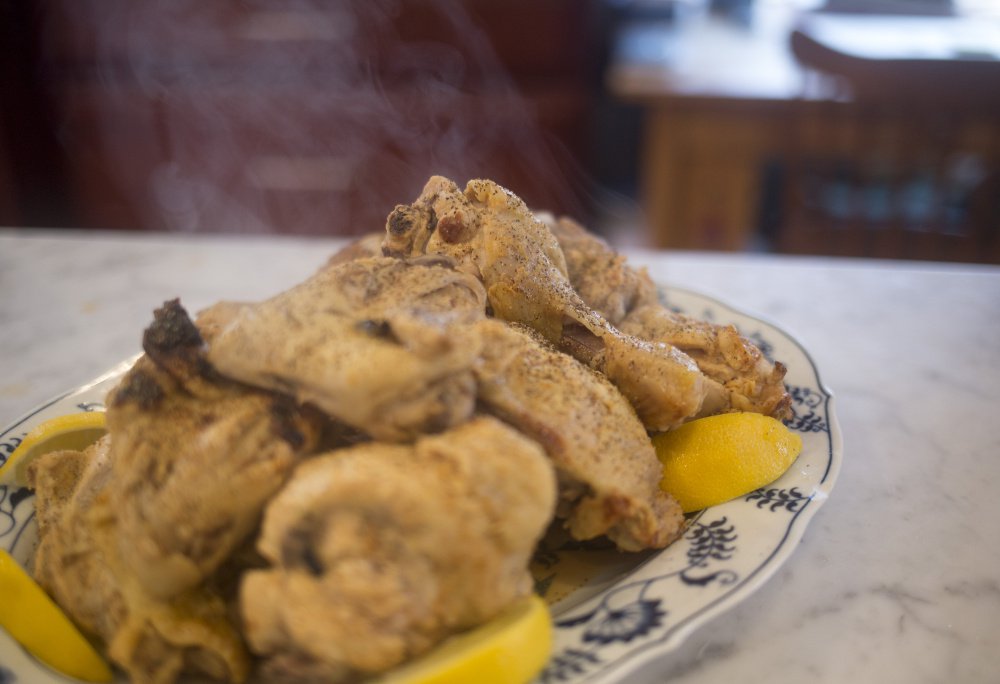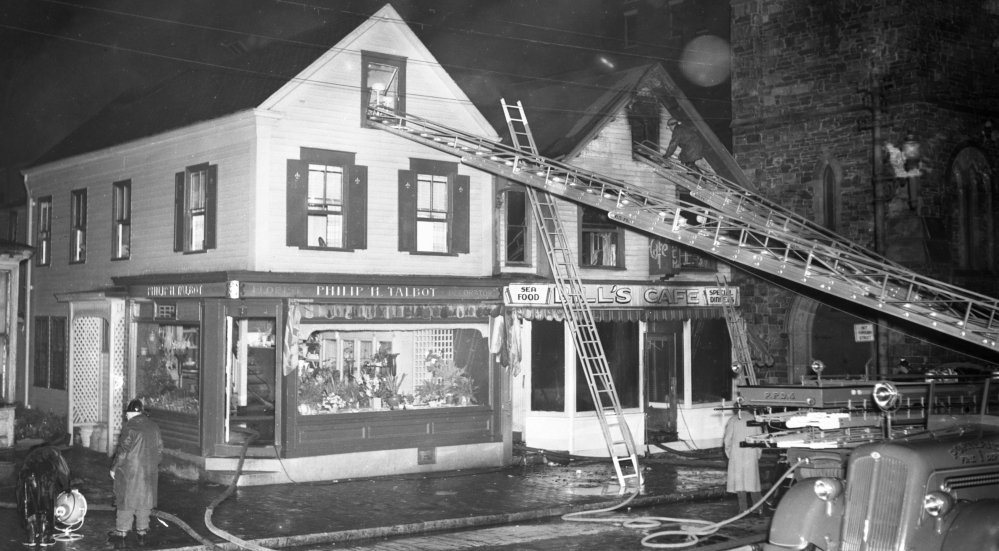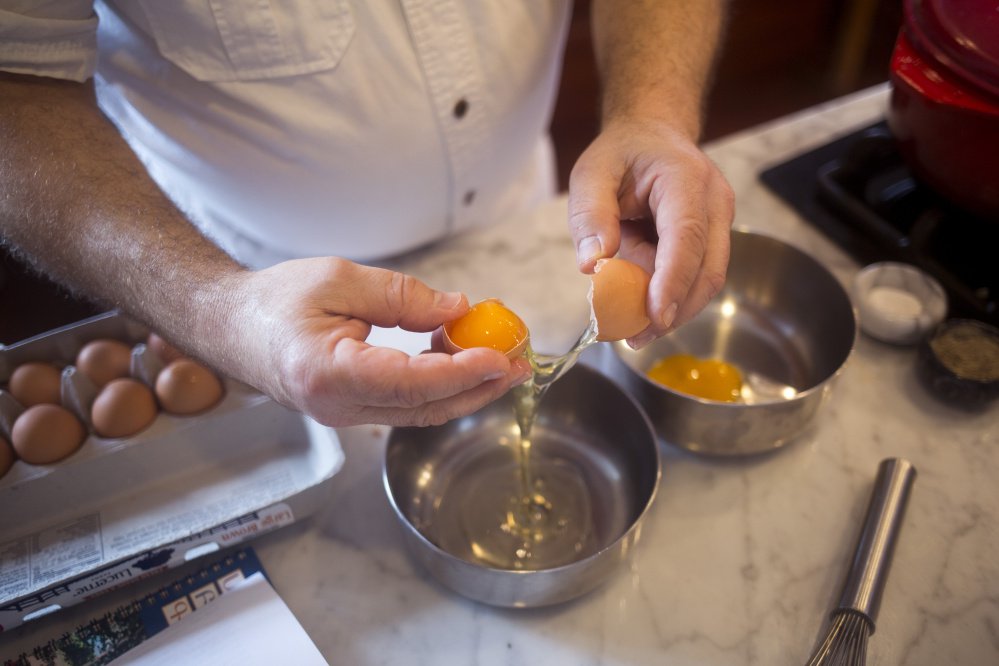Bill Doukas rigorously whipped the egg whites, then the yolks, for his avgolemono – a delicate Greek egg-lemon soup that can be tricky to make – and then combined them in a big silver bowl.
He painstakingly drizzled freshly squeezed lemon juice and hot chicken stock into the bowl, ladle by ladle, being careful not to curdle the eggs.
The egg mixture went into a pot and heated slowly on the stove. While a small bit of rice cooked in the warming broth, Doukas chopped chicken to add to the pot just before serving.
But his 88-year-old uncle – Doukas’ biggest critic in the kitchen – just couldn’t wait. An impatient Petros Panagakos ladled out a bit of the soup to sample. He hadn’t eaten this family specialty, he said, since his wife died a few years back.
“Whoooaaa, very good William!” Panagakos exclaimed after eating a couple of spoonfuls. His eyes lit up. “Four-star rating. But my mother still gets five stars.”
The Panagakos family has firm ties to Portland, including the city’s restaurant community, but their roots go back to the Peloponnese islands in Greece. Panagakos’ father, Vasos Panagakos, came to the United States in 1923 with $60 in his pocket. Doukas said no one knows why Vasos, who started his life as a shepherd, came to this country, but he suspects it was because adventure called.
“I’ll bet America was very attractive,” Doukas said.
Vasos Panagakos got here just in time.
“They halted immigration in 1924,” Panagakos said, noting similarities to today’s political climate. “Only 100 Greeks were allowed to come into the country. And he was able to get in in 1923.
“It was terrible,” he said. “People, they were against the Greeks, the Italians. My dad was lucky to have come in when he did.”

Bill Doukas and his uncle, Petros Panagakos, make Greek favorites at Doukas’ apartment in Portland. Staff photo by Brianna Soukup
The avgolemono soup that Doukas made in his Portland apartment, above the King of the Roll restaurant at the corner of State and Congress streets, is a culinary heirloom that’s been handed down through the generations, along with another favorite family dish, southern Greek-style chicken and rice pilaf. The family’s versions of these classic Greek recipes go back at least as far as Doukas’ grandparents and probably further. The chicken and rice pilaf is a good Sunday dinner to enjoy before watching football, Doukas said.
The pilaf is one of those dishes that is a little bit different from family to family, and even within each Greek family, depending upon who makes it. Members of Doukas’ family use different amounts of tomato paste, for example, and Doukas added chicken bouillon to his version. His brother Andrew swears by cooking the pilaf in one pot.
The soup is a little more finicky, but the flavor is amazing and it suits any season. A bowlful will warm you in fall and winter, but it is light enough to feel like a refreshing spring or summer treat as well.
Vasos Panagakos initially settled in Dover, N.H., where the mills provided plenty of work. Eventually, he opened a restaurant with a partner, later selling his share and moving to Portland. Doukas speculates that his grandfather was attracted to the Greek community in Portland.
The family – Vasos Panagakos married another young Greek immigrant – owned two restaurants in Portland 70 to 80 years ago, back when, Uncle Petros estimates, 80 to 85 percent of the city’s restaurants were run by Greek immigrants. Vasos opened Bill’s Café (Vasos translates to William) on Congress Street in 1937 or 1938 in the place where Boda is now.

A fire destroyed the Panagakos family restaurant, Bill’s Café, in June 1945. They rebuilt and opened Longfellow Restaurant in the same spot. The building today houses Boda restaurant. Portland Press Herald File
“He very seldom had Greek dishes, interestingly enough,” Petros Panagakos recalled. “But the family, which lived upstairs, we always had our Sunday meals and they were always Greek cuisine. One of the most popular ones was the chicken pilaf.”
The menu at Bill’s Café featured American standards such as steak, chops, liver and turkey. Customers could enjoy an entrée of chicken croquettes, along with soup, dessert and coffee for just 95 cents.
One night in 1945, at 1 a.m., Petros awoke to a smoky room and heard his brother Nick urging him to get out of the building. Nick then ran back into the building to rescue their little brother, Panayote. The family living upstairs – nine people – made it out safely before flames enveloped the building.
“We all got out and watched the place burn down,” Panagakos said.
(In the 1950s, Nick became the city hall reporter for the Portland Press Herald. Doukas has hanging in his apartment a large black-and-white photo of Nick interviewing two unidentified starlets who happened to be visiting the city.)
The family rebuilt and about a year later opened Longfellow Restaurant on the same spot.
“It was probably the most modern restaurant in Portland at the time,” Panagakos said. “It had a big lobster at the top of it. It was about 6 or 7 feet high, and it was neon. It lit up. And it was really an eye-catching thing.”
Today, immigrants from places like Africa and the Middle East face prejudice when they come to the United States. In the 1940s and 1950s, Panagakos said, Greeks and Italians were the targets. Doukas remembers that his grandfather was friends with Joseph L. Discatio, the founder of Joe’s Smoke Shop next door to Bill’s Cafe.
When Discatio needed hot water, Doukas said, his landlord, who was “kind of tough on him” because he was Italian, refused to provide it. Discatio turned to Vasos Panagakos for help.
“He came over to my grandfather’s restaurant, and he gave him all the hot water he needed to run his operation,” Doukas recalled.
After 10 years or so in business, Vasos Panagakos retired. He wanted his son to take over, but Panagakos said that after so many years of filling in at the last minute for the chef, the waiters, the dishwashers – he had to quit his high school football team because he was always missing practice – he had soured on the restaurant business.
Fast-forward to the 1980s, when Panagakos’ sister bought the whole block, including the 1858-era building where King of the Roll is now. Doukas, who had been working as an engineer, and his mother, Rita, opened a restaurant there called the Longfellow Café on Thanksgiving Day 1981. After Doukas’ mother died, he changed the name to The Trojan Horse, where he served Greek, Moroccan, Portuguese, Turkish and Middle Eastern food. Around 1991, he returned to engineering. The spot became Shalimar of India, then the Bombay Club, and finally King of the Roll. Doukas and his brother, Andy, inherited their mother’s property. Doukas lives above King of the Roll, while his brother lives above Boda.
Doukas still enjoys cooking. He said he makes the chicken and rice pilaf every three weeks or so. The pilaf was the one Greek dish that was often served in the family’s restaurants. Panagakos recalls that when he lived in Crete, working for NATO in the late 1950s, it was the meal locals would bring over when they’d come for a visit, along with a selection of Greek pastries.
Doukas has been making it himself since he was a college student at Miami University.
“If you get a chicken for a good price, you can make the whole thing for $6,” he said. “No wonder college students and the fathers and mothers of immigrants liked it.”
Making the dishes today, Doukas said, ignites his taste memory, and he remembers what it was like when he was 4 or 5 years old and his mother or grandmother served him this family comfort food.
It also makes him feel more connected to the man who began his life as a shepherd in the hills of southern Greece.
Send questions/comments to the editors.


